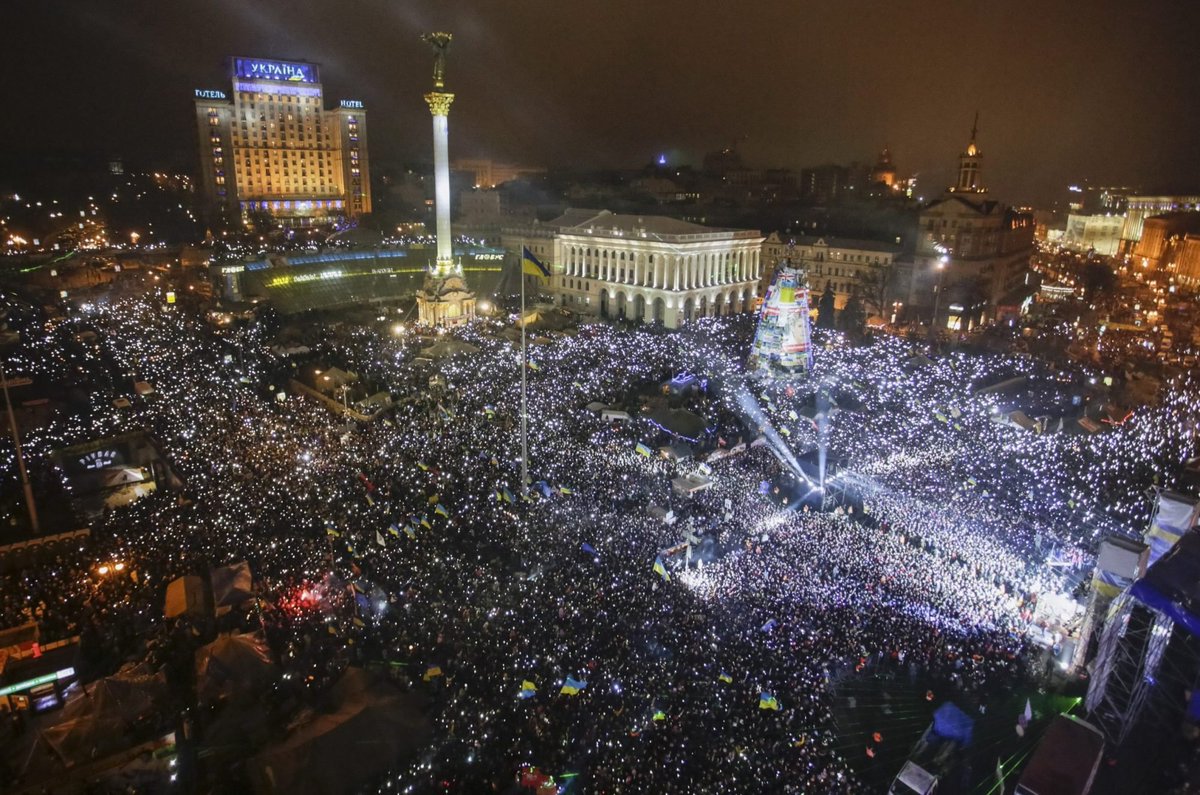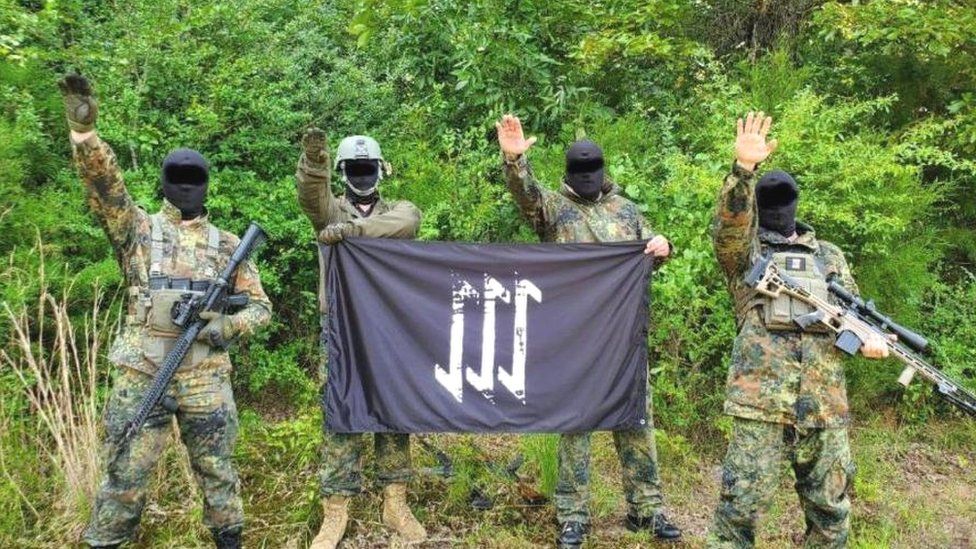You are using an out of date browser. It may not display this or other websites correctly.
You should upgrade or use an alternative browser.
You should upgrade or use an alternative browser.
The Russia - Ukraine Conflict
- Thread starter newarkhiphop
- Start date
More options
Who Replied?Is the man spreading terror in disguise as democracy/imperialism
Can't possibly be a nation that wants to maintain its autonomy while reaching out to the western markets. Anyone who turns away from the east must be a puppet...also, no one is ever a puppet of the east.Puppet of the West/NATO (must likely the US) that’s willing to sacrifice Ukraine


It’s not inevitable Russians will succeed, says defence chief Radakin | News | The Times
It’s not inevitable Russians will succeed, says defence chief Radakin
Some lead forces have been ‘decimated’
January 07 2022, 10.00pm GMT
Russia’s lead forces have been “decimated” in Ukraine and it is not inevitable that it will succeed in taking over the country, the head of the armed forces has said.
Admiral Sir Tony Radakin, chief of the defence staff, said that Russia has “got itself into a mess” with the invasion of Ukraine which is “not going well”.
He warned that Russia could “turn up the violence” with “more indiscriminate killing and more indiscriminate violence” in response to Ukrainian resistance.
Radakin also directly contradicted Liz Truss, the foreign secretary, who said last week that she supports British citizens who want to fight in Ukraine. He said doing so would be “unlawful and unhelpful”.
Radakin, 56, told Sophie Raworth on BBC One: “ “No. I think we’ve seen a Russian invasion that is not going well. I think we’re also seeing a remarkable resistance by Ukraine, both its armed forces and its people.
“We’re also seeing the unity of the whole globe coming together with a cohesive approach, whether that’s economically, diplomatically, culturally, socially, militarily, applying pressure to Russia, and that needs to continue so that Russia stops this invasion.
“We do know that some of the lead elements of Russian forces have been decimated by the Ukrainian response,” he said.
However, Radakin warned that Russian aggression could be ramped up. “I think there is a real risk because Russia is struggling with its objectives on the ground in Ukraine — and we’ve seen from Russia’s previous actions in Syria and in Chechnya — where it will turn up the violence, it will lead to more indiscriminate killing and more indiscriminate destruction,” he said.
“We have to keep applying the pressure to Russia that this is outrageous and that the sense that because your invasion isn’t going very well, that you just become more and more reckless in applying violence is totally unacceptable.” Radakin said that a no-fly zone over Ukraine would not help and would instead escalate conflict. “The advice that we as senior military professionals are giving our politicians is to avoid doing things that are tactically ineffective and definitely to avoid doing things that tactically might lead to miscalculation or escalation.
“The no-fly zone would not help. Most of the shelling is coming from artillery, most of the destruction is coming from artillery, it’s not coming from Russian aircraft.
“If we were to police a no-fly zone, it means that we probably have to take out Russian defence systems and we would have Nato aircraft in the air alongside Russian aircraft, and then the potential of shooting them down and then that leads to an escalation.” Dominic Raab, the deputy prime minister, said that suggestions that Russia is prepared to deploy nuclear weapons in Ukraine are “rhetoric and brinkmanship”.
He told Sky News: “[Putin’s] got a track record as long as anyone’s arm of misinformation and propaganda . . . this is a distraction from what the real issues are at hand — which is that it’s an illegal invasion and it’s not going to plan.
Raab said that the war in Ukraine will take “months at least”. He told Times Radio: “I think anyone is kidding themselves if they thought within days it would be over. This will take months at least to resolve. And that’s why we need to be in this for the long haul. That’s why the prime minister has said there can be no creeping normalisation.”
Radakin said that the UK still has a direct line of contact into Russia’s Ministry of Defence, and that the line was “tested every day”.
“We’ve used that line for me to say to General Gerasimov [Russia’s military chief] that we need to speak and I’m waiting for him to come back to me, and other countries also have direct lines in,” he said.
“These lines of communication are not as strong as we would want them to be and that’s why we’re furthering them as best as we can.”
We have puppets on all sides but who is the real enemy here ?Can't possibly be a nation that wants to maintain its autonomy while reaching out to the western markets. Anyone who turns away from the east must be a puppet...also, no one is ever a puppet of the east.
Andrei V Kozyrev
166 views
48m • 11 tweets • 2 min read
Lots of discussions about the threat of nuclear war from the Kremlin and whether Putin is rational. I share my thoughts in this thread.
To frame: I do not believe Russia would use nuclear weapons and I believe Putin is a rational actor.
First of all, I want to examine where the questioning of Putin’s rationality started. I think it began because most people, particularly in the West, view his decision to invade Ukraine as utterly irrational. I disagree. It’s horrific, but not irrational.
To understand why the invasion was rational for Putin, we have to step into his shoes. Three beliefs came together at the same time in his calculus:
1. Ukraine’s condition as a country
2. Russian military’s condition
3. The West’s geopolitical condition
1. Ukraine’s condition. Putin spent the last 20 years believing that Ukraine is not a real nation and, at best, should be a satellite state. Maidan ended any hope of keeping Ukraine independent and pro-Kremlin. He thought the West was behind it.

If Ukraine’s government cannot be kept independent and pro-Kremlin covertly, as he likely concluded, then he will overtly force it to be. He also started to believe his own propagandists that Ukraine is run by a Nazi-Bandera junta. Perfect pretext to “de-Nazify” Ukraine.
2. Russian military. The Kremlin spent the last 20 years trying to modernize its military. Much of that budget was stolen and spent on mega-yachts in Cyprus. But as a military advisor you cannot report that to the President. So they reported lies to him instead. Potemkin military
3. The West. The Russian ruling elite believed its own propaganda that Pres. Biden is mentally inept. They also thought the EU was weak because of how toothless their sanctions were in 2014. And then the U.S. botched its withdrawal from Afghanistan, solidifying this narrative.
If you believe all three of the above to be true and your goal is to restore the glory of the Russian Empire (whatever that means), then it is perfectly rational to invade Ukraine.
He miscalculated on all three, but that doesn’t make him insane. Simply wrong and immoral.
So, in my opinion, he is rational. Given that he is rational, I strongly believe he will not intentionally use nuclear weapons against the West. I say intentionally because indiscriminate shelling near a nuclear power plant can cause an unintentional nuclear disaster in Ukraine.
I will take it a step further. The threat of nuclear war is another example of his rationality. The Kremlin knows it can try to extract concessions, whether from Ukraine or the West, by saber-rattling its last remaining card in the deck: nuclear weapons.
The ultimate conclusion here is that the West should not agree to any unilateral concessions or limit its support of Ukraine too much for the fear of nuclear war.
• • •
Missing some Tweet in this thread? You can try to force a refresh
Authoritarians and autocrats.We have puppets on all sides but who is the real enemy here ?
more deflecting bullshyt
Real question. Why do you keep signal-boosting Russian propaganda narratives from untrustworthy sources, yet completely ignore far worse information when it comes out about Russia?
No one denies that there are neo-nazis in Ukraine. They're a fringe. They and all the other right-wing ultranationalists got less than 2% of the vote in the last election and don't hold any seats in government. They have a few hundred people in the military leading a squad who Zelensky tried to eliminate (according to your OWN source) and failed so he turns them into cannon fodder instead.
Meanwhile, Putin actively collaborates with his neo-nazi military leaders and sends them to commit war crimes in Africa:
Russia's neo-Nazi paramilitary leaders
Dmitry Utkin, Russian Commander, confirmed neo-Nazi, friend of Putin, recipient of Russia's "Order of Courage", and founder and leader of Russia's paramilitary "Wagner Group", their lead mercenaries for every conflict where Putin doesn't want his legit soldiers getting their hands dirty. These are the guys doing most of the fighting in Africa and they've been fukking up shyt in Ukraine since 2014


Janas Petrovskis, the Wagner Group's lead trainer and another confirmed, proud neo-Nazi


Aleksander Voskanyan, another Wagner Group leader who was found using White Supremacist slogans on social media before he was killed in combat in Syria

Numerous other Wagner Group members push neo-Nazi ideology:


Russia even supports an American neo-nazi group called "The Base" that aims to overthrow the American, Canadian, and Australian governments but whose leader works out of Russia for his own safety


You're literally believing the propaganda of the same people who send these guys out to kill Black folk.

Russian Mercenaries Are Driving War Crimes in Africa, U.N. Says
Russian mercenaries implicated in torture and killing of civilians in Central African Republic - CNN
The Times: Putin has sent mercenaries to Kyiv led by an admirer of the Nazis to murder Zelenskyy and the Klitschko brothers - Romea.cz
https://www.respublica.lt/neonacizmas-rusijos-samdiniu-tarpe


We have puppets on all sides but who is the real enemy here ?
Those in power who use violence in attempts to hurt people and control populations.
I know you are but what am iand you're another one.

